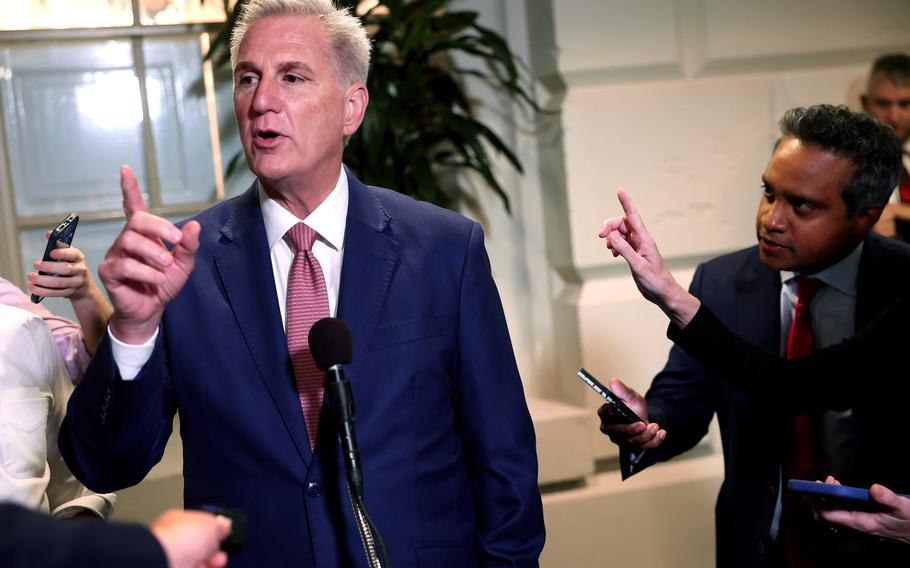
U.S. Speaker of the House Kevin McCarthy (R-California) speaks to reporters as he leaves a House Republican caucus meeting at the U.S. Capitol on Sept. 14, 2023, in Washington, D.C. In a contentious meeting that was scheduled to be on the Biden impeachment, McCarthy outlined his plans to pass a spending bill while fending off threats from members of his own party to remove him with a “motion to vacate.” (Kevin Dietsch/TNS)
(Tribune News Service) — House Speaker Kevin McCarthy announced demands to hold off an Oct. 1 U.S. government shutdown for a month, including an 8% temporary spending cut for domestic agencies and a resumption of border wall construction.
McCarthy presented the plan to Republican lawmakers in a conference call Sunday evening after negotiators representing key factions within the House GOP settled on the demands to temporarily fund the government for 31 days. A House vote on the measure is planned for Thursday.
The demands, which also include provisions curtailing the ability of migrants to claim asylum in the U.S., are anathema to most Democrats and aren’t likely to be accepted by the Democratic-led Senate. That means the bill doesn’t reduce the risk of a shutdown.
The bill also doesn’t contain emergency Ukraine war funds or disaster aid including relief for victims of Maui wildfires and a Florida hurricane requested by President Joe Biden’s administration.
McCarthy immediately faced opposition from some GOP ultra-conservatives that could doom the plan. Six hard-right lawmakers quickly announced their opposition. McCarthy can only afford to lose four Republicans, without Democratic support.
But if McCarthy and the plan’s authors can unite Republicans behind the strategy, it would clear the way for the House to vote on a proposal for temporary funding. Efforts to pass funding measures have ground to a halt in the House amid clashes between GOP hardliners and moderates.
McCarthy became so frustrated with hardliners’ opposition to any spending measures that he dared them at a meeting on Thursday to try to oust him from his leadership position.
The new proposal followed days of talks between leaders of two key Republican factions. Representatives Byron Donalds, a negotiator for the ultra-conservative Freedom Caucus, and Dusty Johnson, leader of the more moderate Main Street Partnership, presented the plan in the conference call.
Still, the plan quickly ran into objections from the hard right that jeopardize its chances in the House.
Representative Rosa DeLauro, the top-ranking Democrat on the House Appropriations Committee, said the GOP proposal was “extreme” and “would cut funding to the National Institutes of Health including funding for cancer research, defund the police, and decrease resources to important allies like Ukraine and Israel.”
Earlier Sunday, McCarthy said he hoped to avert a shutdown because it would undermine Republicans’ leverage in negotiations over federal spending.
“I want to make sure we don’t shut down,” McCarthy said on Fox News’ Sunday Morning Futures. “I don’t think that is a win for the American public and I definitely believe it’ll make our hand weaker if we shut down.”
___
©2023 Bloomberg News. Visit at bloomberg.com. Distributed by Tribune Content Agency, LLC.